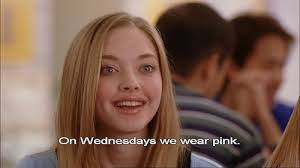Mean Girls: A film analysis
- Nov 26, 2018
- 4 min read

Mean Girls is what would be considered a cult classic. Most, If not all, American teens, preteens, and millennials know what it is and can connect it to quotes like “She doesn’t even go here.” and “I’m a cool mom.” Watching Mean Girls for what seems like the 100th time during the Humanities House Film Festival brought two recurring thoughts to me. First, adults still don’t know how to write young adult stories where they’re not having an insane amount of sex. Writers tend to oversexualize youth in entertainment but more so high school aged girls. Second, this culturally influential film that generations of young adults are watching is highly problematic.
The sexualization of young girls is not very shocking coming from the very male dominated film industry whose writers tend to cater to the male gaze. The writer of Mean Girls however, is a woman - Tina Fey. This really made me think about the intention of the writer in terms of the message she wanted to send. Mean Girls is obviously satire, but it’s still harmful. It all comes down to pointing fingers the wrong way. It basically demonizes high school girls who, while cruel, are not the only ones to blame for the chaos. Fey addresses the complacent and unaware parents but it’s not enough because in Ms. Norbury’s rousing speech reprimanding the girls and preaching sisterhood, only the girls are called out in the auditorium. Not the boys in the school who stand by amused at all their antics, not the gym teacher who should know not to sleep with students, not their parents, not the culture created by society that everyone continues to perpetuate.
Not only that but the girls are blamed for things out of their control and trivial things as well. They are shamed for being sexually active and being ignorant but are not given proper sex education in school because the teacher is not knowledgeable and too busy sleeping with students to teach properly. The girls are also slut shamed every chance anyone gets. But of course to serve the purpose of the movie, they are conveniently only slut shamed by other girls. From their halloween costumes to the daily attire of the Plastics and their Christmas costumes at the Winter show, there are more than enough examples of oversexualization.

Mean Girls makes light of so many things that are wrong in the world, as is the nature of comedy. However, the social and political climate of the country at that moment didn’t lend it to being very receptive of the message the movie tried to send. Especially such a rushed message that is only really addressed in the last 20 or so minutes of the movie. Taking into account the historical context, it makes sense since the homophobia, subtly racist generalizations, and stereotypes were a mirror image of social relations in the United States in 2004, the year the movie was released. It was acceptable to make fun of people for being gay, alright to generalize Asian people, and more than fine to assume that all Black people spoke Swahili and label them as unfriendly for being offended by it as Cady did during the lunchroom clique breakdown scene.

So much is worrisome in this movie. Aside from what actually happens, the impact that it must have made at the time is unthinkable. Girls are portrayed as only following the lead of other girls, being vapid, not being able to think on their own, and being academically inferior or dumbing themselves down to get the attention of guys. The unrealistic standards set for younger female viewers watching the movie are also scary. The only girls actually considered hot or conventionally pretty to everyone in the film are the three plastics who are all obsessed with their weight and physical features. Regina possibly has an eating disorder and they all have insecurities that seem to consume their personalities.
Despite all this, it was nearly impossible to not laugh at the movie as a whole. I was hesitant at first because I’d seen it so many times. To my surprise, I learned more than I did the many times I’d watched it before. This was the first time, I‘d watched Mean Girls in full in a couple of years and I can honestly say, this is the first time I’ve been truly able to see it through an analytical lens as opposed to simply watching it for enjoyment purposes. I’ve always just seen it as another one of those movies that everyone likes because it’s been around for so long and it has good, quotable phrases that everyone knows like “You go, Glencoco” or “On Wednesdays we wear pink.”

Overall, despite its issues, Mean Girls has proven to be substantially more significant than I thought it was. My favorite thing about the movie is that the characters face some sort of consequence. It has been a trend in movies directed at the youth lately for them to do unimaginable things and not face actual consequences. Sierra Burgess is A Loser is a great and recent example of this. I think that sets a bad precedent, especially when you acknowledge the effect that popular culture has on the lives and actions of people, but specifically young people. It shows that consequences are a thing for the real Cady Herons and Regina Georges of the world and that’s a better and clearer message to send.








































Comments